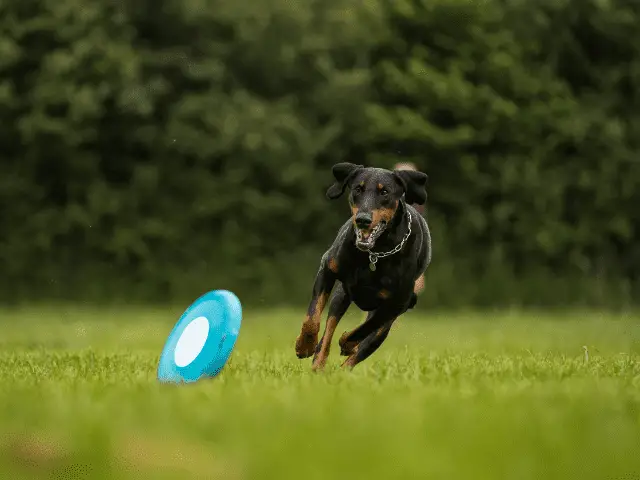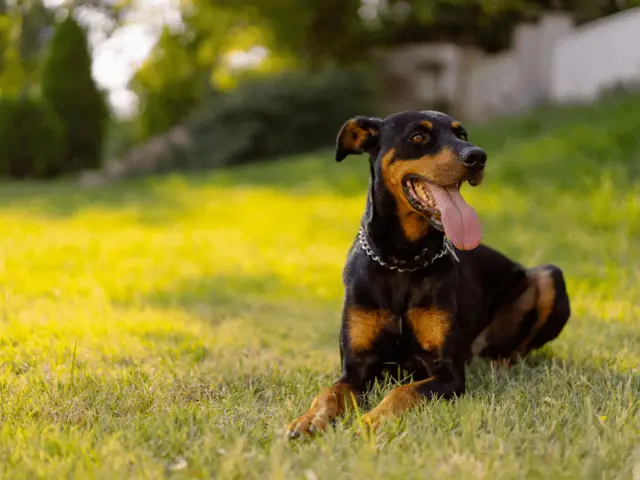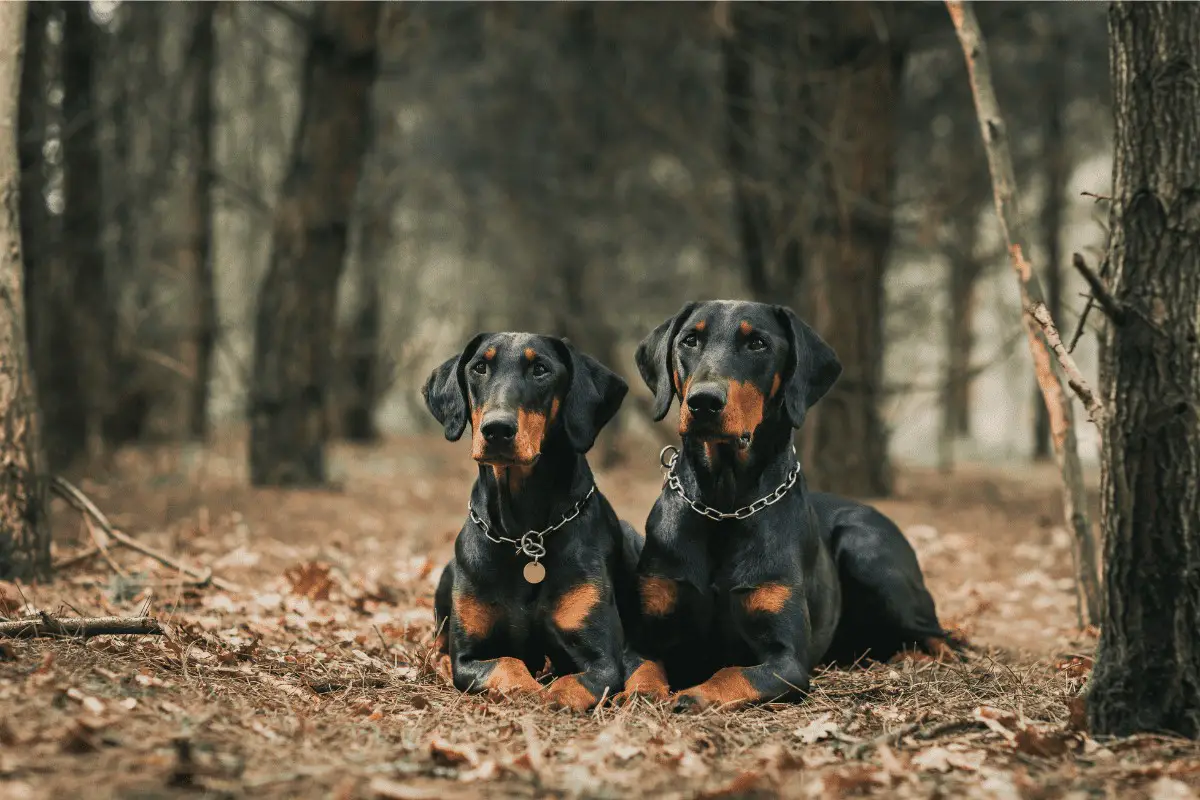Spending time outdoors has been proven to improve mental health and overall wellbeing and adding a canine companion to your travels is a great way to make hiking even more fun.
Just like people, dogs enjoy a variety of different activities and for hikers considering bringing a canine companion along for the adventure, it’s important to understand the breed and the best conditions for each individual dog.
Doberman Pinschers, also referred to as Dobies, Pinschers, or Dobermans for short are the ideal hiking companion due to their incredible intelligence, muscular build, and instinctive watchdog tendencies. Understanding the breed, their health considerations, and what types of activities they excel at will create an ideal lifelong hiking buddy.
Health Consideration for Doberman Pinschers

Doberman Pinschers are robust, regal dogs with a large frame and muscular physique that are generally fairly healthy dogs. The average lifespan for this breed is between 10-12 years, so owners can expect to spend plenty of time on the trail with their canine companion over the years.
are robust, regal dogs with a large frame and muscular physique that are generally fairly healthy dogs. The average lifespan for this breed is between 10-12 years, so owners can expect to spend plenty of time on the trail with their canine companion over the years.
However, this breed is predisposed to a number of health conditions that may interfere with hiking abilities and their quality of life and owners should always consult their veterinarian before hiking.
Bone & Joint Diseases
Being a large breed weighing between 70-100+ pounds, Doberman Pinschers often suffer from elbow or hip dysplasia . This condition causes irregular growth of the ball and socket joint, causing the femur and the adjoining socket of the pelvis to grow at disproportionate rates. This irregular growth creates laxity of the joint which can lead to degenerative joint disease or osteoarthritis
. This condition causes irregular growth of the ball and socket joint, causing the femur and the adjoining socket of the pelvis to grow at disproportionate rates. This irregular growth creates laxity of the joint which can lead to degenerative joint disease or osteoarthritis .
.
Thorough veterinary evaluation of hip radiographs in parent dogs can often prevent this condition in puppies, but owners for dogs diagnosed with the condition may have to make adjustments to the type and length of hiking their Dobie is accustomed to.
Slow, controlled hikes on level terrain may actually be beneficial to dogs diagnosed with hip dysplasia as movement helps reduce stiffness and swelling of the joints, but longer, more physically challenging hikes should be avoided.
Additionally, owners can provide supportive care in the form of feeding a balanced diet for each stage of life, adding joint support supplements, or taking advantage of veterinary rehabilitation services.
Doberman Pinscher owners should schedule their dog for a thorough veterinary exam before hiking and monitor affected dogs for symptoms of pain such as limping, lethargy, or being slow or unable to rise after periods of activity.
Cardiac Conditions
Doberman Pinschers have been shown to be disproportionately affected by a cardiac condition known as dilated cardiomyopathy which is a genetic condition affecting the heart’s ability to contract. Pinschers diagnosed with this condition are not candidates for hiking as the disease can cause exercise intolerance, heart arrhythmias, collapsing episodes, and sudden death.
which is a genetic condition affecting the heart’s ability to contract. Pinschers diagnosed with this condition are not candidates for hiking as the disease can cause exercise intolerance, heart arrhythmias, collapsing episodes, and sudden death.
Thyroid Disease
In addition to cardiac and joint diseases, Pinschers are also predisposed to autoimmune conditions that may make hiking more challenging if left untreated. The most common is hypothyroidism or underactive thyroid which can result in weight gain and exercise intolerance leading to reduced stamina when it comes to hiking.
or underactive thyroid which can result in weight gain and exercise intolerance leading to reduced stamina when it comes to hiking.
Owners of Dobies diagnosed with this condition should consult with their veterinarian to discuss any physical limitations due to the condition and ensure it is safe for their pup to continue or resume hiking.
Doberman Pinschers Enjoy Physical Activity

Doberman Pinschers are a large, powerful breed that enjoy interactive physical activities with their owners and family.
Most Dobies require a moderate amount of physical activity daily and they excel at walking, hiking, and running to burn off some of their constant energy. While Dobies find these activities enjoyable, they also love games that test their strength like tug of war, playtime with other dogs, and swimming.
Healthy, well-conditioned Dobermans can easily hike up to 5 miles on the trail. Owners setting out on a hikes longer than 5 miles should ensure they bring plenty of water as Dobermans have a tendency to get hot easily.
Swimming is another great way that Dobies can cool off during prolonged periods of physical activity, but they don’t always take to water naturally. Introducing Pinschers to water activities at a young age can help Dobies become comfortable and confident swimmers.
Pinschers Crave Mental Stimulation
Doberman Pinschers are a highly intelligent breed that crave daily mental stimulation to keep them happy and healthy. Owners should be prepared to offer at least one to two hours of mentally stimulating activities each day to avoid Dobies creating their own fun, which may often be destructive or undesirable.
As a highly intelligent breed, Doberman Pinschers take quickly to obedience training, making them excellent off leash hiking companions with exceptional recall. Owners can easily incorporate mentally stimulating activities into their hikes including recall training, nosework, obedience training, and exploring new sights and sounds along the trail.
Dobies Prefer Mild Climates

While Doberman Pinschers make excellent hiking companions in most conditions, hikers may want to consider leaving their pup at home during extreme weather. Like most dogs, Dobermans can tolerate occasional hot days or harsh winter weather, but only in small doses due to their lack of insulation.
The short hair coat found on Dobies is not sufficient for protecting them against severe weather conditions and hikers planning to bring their dog along should ensure they bring plenty of supplies and know the risks for themselves and their pets.
Cold Weather Hiking with Doberman Pinschers
Owners planning a cold weather hike with their Doberman Pinscher should ensure they bring appropriate gear for their pup like a well-fitted winter coat, snow booties, and plenty of water.
Owners should monitor their dogs for signs of hypothermia and be prepared for emergency situations with supplies like extra water, dry blankets, medications, and emergency contacts.
and be prepared for emergency situations with supplies like extra water, dry blankets, medications, and emergency contacts.
Warm Weather Hiking with Doberman Pinschers
In warmer climates, Dobermans can easily become overheated and owners should make sure they stay in shaded areas of the trail and take plenty of breaks along the way to offer their pet water.
Dobie owners should monitor their pet for signs of hyperthermia and seek emergency veterinary care. Hyperthermia in dogs can be prevented by avoiding hiking when temperatures are above 90°F.
and seek emergency veterinary care. Hyperthermia in dogs can be prevented by avoiding hiking when temperatures are above 90°F.
Camping with Doberman Pinschers
Doberman Pinschers have often been portrayed as ruthless guard dogs in media and although they possess an instinctive protective nature, they are generally accepting of strangers and other dogs. This characteristic paired with their high adaptability to new situations makes them ideal camping buddies for hikers setting out on multi-day excursions or wilderness retreats.
Although Pinschers are hardy, muscular dogs, they should never be left unattended at a campsite, especially after nightfall. While Doberman Pinschers typically stay close to their owners, their high prey drive and the potential for running off after dangerous wildlife may pose a risk to this headstrong breed.
Elevation Hiking with Dobies
Most healthy, athletic dogs like the Doberman do very well when it comes to hiking at high elevations. However, just like humans, high elevation hiking with dogs can place added stress on the body and extensive training is required to avoid potentially life-threatening situations.
Before beginning training, owners should ensure their Doberman receives a thorough veterinary exam as high elevation hiking is not recommended for dogs with diagnosed medical conditions or without proper veterinary clearance.
When training, Doberman Pinschers should always be kept on a leash to control speed and increase gradually as owners monitor for any signs of discomfort.
Dobies should also be encouraged to take plenty of time to rest and drink water as hiking at high altitudes can quickly cause dehydration. Owners should monitor their pet for any signs of discomfort or altitude sickness and immediately reduce altitude and offer water if their pet has difficulty breathing, nausea or vomiting, excessive panting, or pale gums.
and immediately reduce altitude and offer water if their pet has difficulty breathing, nausea or vomiting, excessive panting, or pale gums.
Doberman Pinschers can make wonderful hiking partners for outdoor enthusiasts who want company on the trail. This athletic, highly active breed naturally excels at most physical activities and hiking is a great way to keep pets happy and healthy while building memories on the trail that will last a lifetime.
Have More Dogs In Your Pack?
Zenful Hiking has dozens of hiking guides for all different breeds of dog, ranging from Pitbull to Poodles. Use our resources to ensure all your hikes with your four-legged hiking partners are safe and fun!

